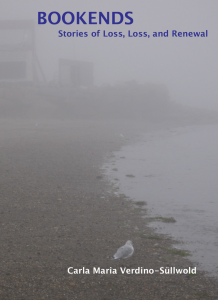
The characters in these stories are, for the most part, weak, wispy women—widows adrift, and vaporous young women with overbearing mothers (more than once called dragons)—who seem not so much unable to cope as unable to navigate when the men in their lives abandon them or, more often, die (treadmills are dangerous places for Verdino-Süllwold’s male characters).
My favorite story of the lot featured one of the least appealing of the young women, yet it resolved into a nice take on the Elizabeth Barrett-Robert Browning romance (featuring a dragon mother rather than Barrett’s dragon father). The reader does not get to see the young woman blossom, but the seed of hope is planted. She has been rescued, though, by her Browning, and it is clear that he is the strong character here, not she.
The tone of the collection is melancholy and wistful with little, if any, resolution. These aren’t fully-wrought stories, but are more like vignettes, and as such may be a bit too elliptical for most tastes. However, taken as a whole, the stories do offer something approaching a motif, if not much in the way of narrative. A line from the last story in the book (oddly enough describing a young man rather than a woman) not only reflects the theme of endings that bookend our lives but also offers a bit of relief from the lassitude that permeates the rest of the stories.
And then it was over – a transforming chapter in a boy’s young life closed, one of the many endings that shape an actor’s experience.
Nonetheless the book leaves the reader with less catharsis than one might hope, merely a sense of ineffable loss and a spirit too weak to do much about it.
Though generally well-written, the book has a few issues. It contains far too many clichés, both in language and theme: “the great doors a gaping maw ready to swallow her up” and “surging torrents of grief,” and of course all those swooning girls and dragon mothers. At times the imagery is simply overdone. The sound of a ringing phone (heard by one of the young women fresh from a swoon) is described in this way: “From the black hell of this ninth circle, chimes sounded like a knell.”
Yet occasionally Verdino-Süllwold does rouse the reader with a dead-on image. One of the dragon mothers is altering a wedding dress for her granddaughter, and is described thusly: “a mouth full of pins projected like quills from her thin, sternly set lips.” That pretty much sums up Verdino-Süllwold’s dowager dragons. The action and settings are fully described, and the dialogue is nicely paced, but the characters lack interiority. I expect this is in service of the theme, yet I couldn’t help but suspect that there was little interiority there for some of these women. Verdino-Süllwold wisely refuses to indulge her characters, but I found myself wishing that they would develop a bit of strength for themselves. In any case, this distance from the protagonists had the effect of making me care far less about them than I would have liked.
These stories are full of opera, and like opera, where the libretti are incomplete apart from the music, these stories seem to lack a substrate. I finished the book with the vague sensation that I had missed most of it. The characters, their lives—how they might view and perhaps learn from their own losses—were just a bit too far removed. However, those who enjoy elliptical fiction that does not nudge the reader in any particular direction will like this short, easy-to-read collection.
Links
Amazon
Barnes & Noble
Review Overview
Design
Editing
Content
Get an Editorial Review | Get Amazon Sales & Reviews | Get Edited | Get Beta Readers | Enter the SPR Book Awards | Other Marketing Services






















Leave A Comment